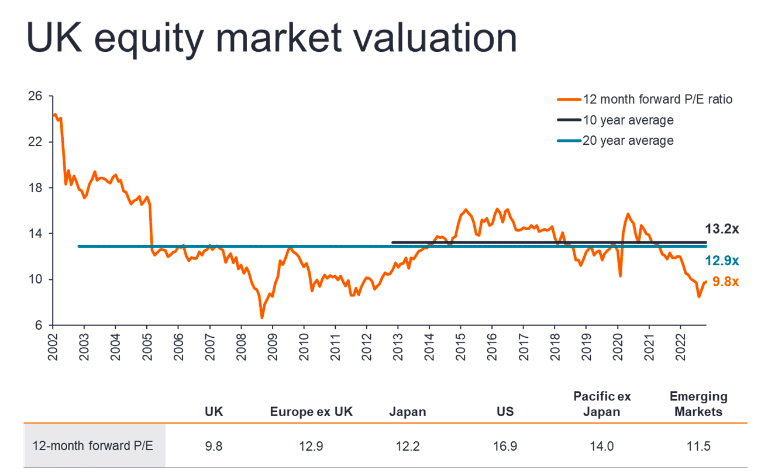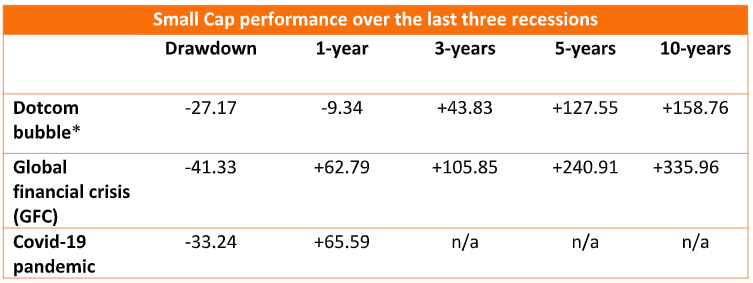Subscribe
Sign up for timely perspectives delivered to your inbox.
Following a gloomy 2022, 2023 has brought tentative reasons for optimism on the global economy. In particular, softening inflation and hopes that the recession may not be as severe as expected. Smaller companies have often performed well during periods of improving economic sentiment. Following a challenging year, is now the time to reconsider small cap stocks?

While 2022 was bad for almost all assets, it was particularly bad for smaller companies, with the Numis Smaller Companies Index (ex Investment Companies) down 17.9% all-told by the end of the year.1 The economic and investing environment has been dour for a number of reasons. First, high inflation and interest rates are curtailing the spending power of consumers. Prices for essential items such as food and clothing have become significantly more expensive, while higher mortgage rates have eaten into disposable income. Second, given that smaller companies tend to have more domestic consumer exposure, the cost-of-living crisis has been having a direct impact on revenues.
Slowing growth and uncertainty are never a good combination for smaller companies where operational risks are perceived to be more concentrated versus their large-cap peers. And it’s no surprise, that they have struggled in this market environment. However, we believe that the sell-off has become overstretched and too much gloom is being reflected in the prices of these assets.
What is more, we’re in the midst of a slowdown deliberately manufactured by central banks to deal with inflation, which is showing signs that it may be peaking. Indeed, if the inflationary picture starts to markedly improve over the coming months, Central Bankers might change tack or at the very least, not continue to hike base rates. Given this scenario, we believe there are three reasons investors should be looking to invest in small cap stocks.
Many a seasoned investor will see the opportunity to enter stock markets when they are depressed. In essence, there’s the potential to buy great assets at discount prices and given that you are starting from a low base, it can offer the opportunity for strong returns. The UK, in particular, is looking cheap when compared to other markets. For example, when we look at the 12-month forward P/E ratio, UK stocks are much cheaper relative to history and compared to global peers.

Source: DataStream, MSCI regional indices, Janus Henderson Investors Analysis, as at 31 December 2022.
Note: Forward price-to-earnings (forward P/E) is a version of the ratio of price-to-earnings (P/E) that uses forecasted earnings for the P/E calculation. There is no guarantee that past trends will continue, or forecasts will be realised. The views are subject to change without notice.
Based on the recent sell-off, the market does not seem to be discerning between good and poor companies – meaning even high-quality companies have also been caught in the storm. While the performance of stocks over the short-term is largely driven by sentiment, over the long-term, valuations matter. To us, current valuations look attractive, potentially offering a great starting point to investors looking to invest in the space.
When assessing performance, context is very important, especially when dealing with smaller and medium-sized companies. While periods of short-term underperformance are obviously disappointing, it’s important to retain the longer-term view. If we look back through history, small caps have outperformed their larger-cap counterparts over the longer-term. In addition, following periods of underperformance – where the value of shares drop by more than 20% relative to large cap stocks – small caps tend to perform strongly afterwards. The Numis Smaller Companies Index (excluding investment companies) offers some evidence. Since the Second World War, the global economy has witnessed four global recessions. Though small cap stocks struggled during periods of high volatility, they bounced back stronger than their larger-cap counterparts and significantly outperformed them in the subsequent years (see below). Since smaller companies tend to be more economically sensitive, they tend bounce back more quickly and grow more rapidly as we come out of a downturn. Since no one can predict when the current downturn is going to end, we believe investors with a small cap risk tolerance should view the current environment as a potentially opportune time to consider small caps.

Source: Factset as at 27 February 2023
Note: Periods being covered:
· Dotcom bubble – 31/03/2000 – 30/09/2001,
· Global Financial Crisis – 31/12/2007 – 31/01/2009
· Covid-19 pandemic 31/01/2020 – 31/03/2020.
*For the Dotcom Bubble we used the NASDAQ Index but for the GFC and Pandemic, we used the Numis Smaller Companies Index (ex Investment Companies).
Past performance does not predict future return
Another factor to consider is activity within M&A. Takeovers are a strong source of returns in the smaller company space, and the outlook for mergers & acquisitions (M&A) has begun to improve as buyers accept that corporate financing costs are likely to be higher for years to come. UK Plc is looking the most attractive it has in years, it is still sitting at a 40% discount to global peers, low not seen in 40 years, and company valuations remain cheap. What is more, following the wave of recapitalisations undertaken by corporates during the pandemic, company balance sheets are in a good shape. In addition, a calmer political backdrop in the UK may reduce risks in dealmaking. A big potential candidate for takeovers is private equity where they retain a lot of ‘dry powder’ – cash waiting in the wings to be deployed. Given the weak pound, particularly against the dollar, the purchasing power of other currencies to buy into firms increases the attractiveness of deals.
Macroeconomic uncertainty remains at elevated levels. Tight labour markets may render inflation sticker than the market is forecasting, which curtails the chances of a pause in interest rate rises. However, the flight to safety in 2022 led to an indiscriminate sell-off stocks in the small and mid-cap space. We believe the consequent attractive valuations on offer in that part of the market in conjunction with low investor sentiment provide a good entry point for investors.
Within the portfolio, we are focused on investing in high quality companies in the small and mid-cap space that should have the means to survive a downturn if it materialises and thrive once it abates. Our investment process should yield a portfolio of companies that have enduring franchises, strong competitive advantages, experienced management teams that can navigate complex environments, and robust balance sheets. In fact, over half of the portfolio value has balance sheets with net cash. Selectivity and good stock picking will be crucial as the strength of the franchises, their market positioning, and the health of their financials will likely determine the winners from the losers. For the long-term investor, it seems now is an opportune moment to invest in the UK’s smaller innovative firms that have the potential to grow far faster than their larger counterparts and deliver strong long-term returns.
1Source: Bloomberg as 27/02/2023